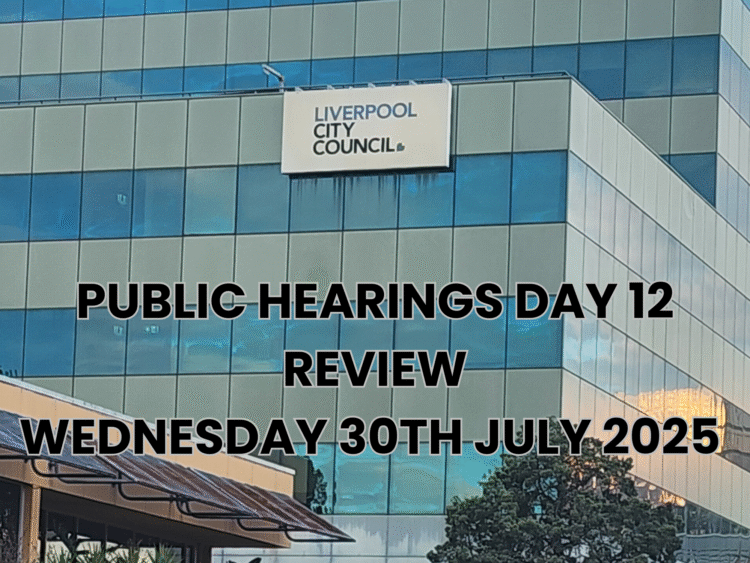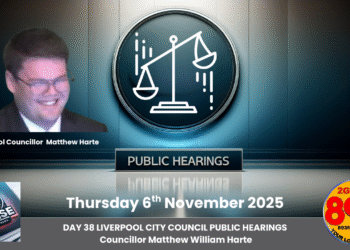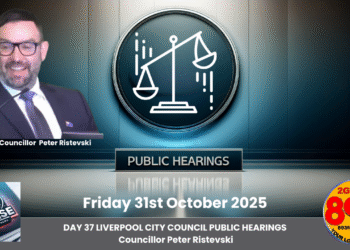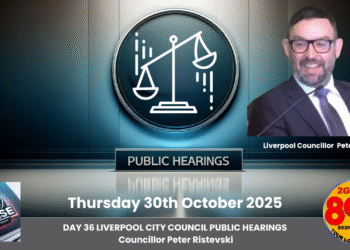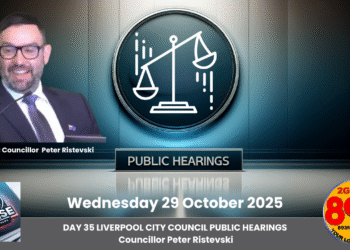Mr Ajaka’s testimony on Day 12 focused on events leading up to a council meeting on 24 April 2024, specifically addressing his awareness of union-organized staff meetings and rumors of job losses at Liverpool City Council.
Ms Richardson revisited a sequence of events from April 2024, noting a council meeting on Wednesday, 24 April, preceded by a radio interview with Ray Hadley on Tuesday, 23 April, and a rumor about 150 potential job losses circulating as early as Monday, 22 April. Text messages between Mr Ajaka and Councillor Goodman, dated 22 April, were presented to confirm Ajaka’s awareness of union activities. These messages included a flyer sent by Councillor Goodman to Ajaka on the evening of 22 April, advertising urgent United Services Union (USU) member meetings scheduled for 23 April at various times and locations (Discovery Park at 8 AM, Learning Pod at 12 PM, and Teams at 1 PM and 6:30 PM). The flyer explicitly stated the meetings were paid and urgent due to a “potential threat to a large number of council jobs,” alleging that Mayor Ned Mannoun might barter livelihoods for election promises at the upcoming council meeting.
For Liverpool ratepayers, the circulation of rumors about significant job losses—potentially 150 positions—raises serious concerns about transparency and stability within our council. If such threats were being discussed or perceived as linked to political promises, as suggested by the union flyer, it could signal mismanagement or prioritization of political agendas over staff and service stability. As ratepayers, job cuts or uncertainty among council staff could disrupt essential services like waste management, planning and community programs.
Communication with Councillor Goodman
The text messages revealed a dialogue between Mr Ajaka and Councillor Goodman starting at 6:20 AM on 22 April, with Ajaka attempting to contact Goodman and later responding to the union flyer. Goodman questioned whether staff were paid to attend meetings to “rally against the council,” to which Ajaka confirmed that, per an agreement, staff could be paid for every second meeting. Ajaka acknowledged reading the flyer at the time, including its urgent tone and details of the multiple meeting options, despite the small font making it hard to read during the hearing.
As ratepayers, the interaction between Ajaka and Councillor Goodman about union activities suggests a tension between council leadership and staff representation. The fact that paid meetings were organized to rally against perceived council actions, and that senior figures like Ajaka were aware but potentially dismissive (as implied by Goodman’s tone), raises questions about internal communication and conflict resolution. For us, unresolved tensions could lead to inefficiencies or strikes, impacting service delivery funded by our rates, and we need assurance that leadership addresses staff concerns constructively rather than reactively
Why This Matters to Liverpool Residents
As ratepayers in Liverpool, the revelations from Day 12 of the inquiry underscore potential issues with transparency, job security, and internal relations at our council. The union’s urgent call for meetings over fears of mass job losses—linked to possible political motives by Mayor Mannoun—suggests a lack of clear communication or trust between council leadership and staff. For us, this instability risks disrupting the services we rely on, funded by our contributions to a budget over $530 million. If job cuts or rumors thereof are mishandled, we could see reduced capacity for essential functions like infrastructure maintenance or community support across our suburbs.
Moreover, the awareness of such issues by senior figures like Mr Ajaka, and their casual discussion with councillors, highlights a need for proactive leadership to address staff concerns and prevent escalation. As ratepayers, we deserve a council that prioritizes stability and open dialogue over potential political maneuvering, ensuring our rates are used effectively to maintain a functional, supportive local government.









